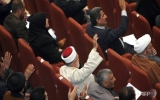Airport security ramped up over US bomb fears
The stepped-up checks were ordered as the US embassy in Uganda warned of a "specific threat" to attack Kampala's Entebbe international airport between 1800 and 2000 GMT.
The new checks focused on electronic items such as laptops and mobiles, fuelling fears that extremists such as Al-Qaeda could use them as their latest tactic in a long campaign of attacks involving aircraft.
US Homeland Security Secretary Jeh Johnson announced the extra security on direct flights to the United States from some overseas airports on Wednesday, without citing evidence of any specific plot.
The move comes amid broader Western intelligence concerns that hundreds of Islamist radicals travelling from Europe to fight in the Middle East could pose a security risk on their return.
On Sunday, US President Barack Obama warned that "battle-hardened" Europeans who embrace violent jihad in Syria and Iraq threaten the United States because their passports mean they can enter without a visa.
The airports concerned are located in the Middle East and Europe and were targeted "based on real-time intelligence," according to Homeland Security Department official who spoke on condition of anonymity.
Britain confirmed it was bolstering security at its airports in response.
Belgian Interior Minister Joelle Milquet, whose country is also stepping up airport security, told RTL-TVI the measures would focus on electronic equipment such as tablets, computers and mobile phones "to make sure there are no explosives."
'Ultimate prize'
"We have a long-standing concern of terrorist groups in trying to get undetected material on the planes," a US intelligence official told AFP.
Al-Qaeda in the Arabian Peninsula (AQAP) "is always the group we think about when we talk about undetectable bombs," the official added.
A second US government official noted that there was also "concern about groups that associate with one another and obviously enhance the threat environment."
There are concerns AQAP is passing on bombmaking expertise to militants fighting in Syria and that extremists with European passports could then bring these skills back home with them and launch an attack.
Brooke Rogers of the War Studies Department at King's College London said that for extremist groups, bringing down an aircraft was the "ultimate prize -- if the attackers succeed, it will be spectacular for them."
And "unfortunately in aviation, it doesn't take a big amount (of explosives) to make a boom," said US airplane security expert Jeff Price.
Experts say that if anyone could be behind the threat, it was Ibrahim al-Asiri, a 32-year-old Saudi believed to be hiding out with AQAP in Yemen's restive southern provinces.
The terror alert in Uganda further rattled nerves, but it was not immediately clear if it was linked to the airport security boost.
Although the US embassy did not name any group, Shebab insurgents linked to Al-Qaeda have claimed attacks in neighbouring Kenya, including the Westgate mall bloodbath, and Djibouti, as well as at home in Somalia.
Despite the increased checks, Britain said the international terror threat level issued by security service MI5 remained unchanged at substantial, the third highest grade out of five, where it has been since July 2011.
Prime Minister David Cameron said Britain was taking a "safety first" approach.
"This is something we've discussed with the Americans, and what we have done is put in place some extra precautions and extra checks," he told television channels.
"The safety of the travelling public must come first -- we mustn't take any risks."
His Downing Street office said there was an "evolving threat" but declined to provide further details.
Officials insist passengers should not face significant delays, and London's Heathrow airport -- one of the world's busiest international air hubs -- and Gatwick, south of the capital, were both operating normally.
Passengers in Britain have long faced tight security measures at airports following high-profile threats, including a failed attempt by British "shoe bomber" Richard Reid to blow up a US-bound flight in 2001.
Security was further tightened after a plot to blow up "liquid bombs" on transatlantic flights was uncovered in 2006.
A previous high-profile attempt by AQAP to blow up a US-bound plane failed on December 25, 2009, when Nigerian Umar Farouk Abdulmutallab tried to detonate explosives hidden in his underwear.
The Detroit "underwear bomber" is now serving a life sentence in the United States.
AFP
 Seminar seeks ways to boost ASEAN - Latin America connectivity
Seminar seeks ways to boost ASEAN - Latin America connectivity
 Indonesia seeks India's help in health education
Indonesia seeks India's help in health education
 Indonesia named world's most generous country in 2024
Indonesia named world's most generous country in 2024
 Philippines: Over-4m-high floodwaters make thousands of houses submerged
Philippines: Over-4m-high floodwaters make thousands of houses submerged
 Singapore’s public sector records carbon reduction in 2023
Singapore’s public sector records carbon reduction in 2023
 Pressure facing the EU on its growth track
Pressure facing the EU on its growth track
 Efforts boosted to combat transnational organised crime
Efforts boosted to combat transnational organised crime
 Nearly 200 terror suspects arrested in Indonesia in two years
Nearly 200 terror suspects arrested in Indonesia in two years
 Vietravel launches tourism joint venture in India
Vietravel launches tourism joint venture in India
 Vietnam willing to enhance int'l cooperation in transnational crime combat
Vietnam willing to enhance int'l cooperation in transnational crime combat



